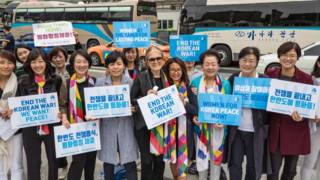
Related
Reporter Matthew Cole discusses his piece for The Intercept headlined “The Pentagon’s Missionary Spies: U.S. Military Used Christian NGO as Front for North Korea Espionage,” that looks into U.S. efforts to penetrate North Korea by funding groups like the Humanitarian International Services Group, which was founded by Kay Hiramine, who was a Pentagon spy whose NGO was funded through a highly classified Defense Department program.
Transcript
JUAN GONZÁLEZ: I wanted to ask you—-we just have a few minutes—on your fascinating story late last year on missionaries in North Korea.
MATTHEW COLE: Yeah, so last year we published a story about a Pentagon program that ended in—at the end of 2012, about a espionage effort that the Pentagon started in 2004, 2005, using and funding an NGO, an NGO out of Colorado run by evangelical Christians, who were doing humanitarian work around the world. And what it was, was the Pentagon funded this group in an effort to get the head of the group legitimacy in the NGO world, so that they could then get him into North Korea, so that they can move materiel, so that they could collect intelligence.
And so, for about a eight-year period, the Pentagon funded this organization that—by the way, the organization did—90, 95 percent of their work was legitimate. You know, nearly everyone in the company—or, the organization, had no idea that they were acting as a front for the Pentagon. And it’s important to remember that, because they were missionaries who were doing really important work all over the world. And they did very good work. And it was really sad, actually, to interview people who had worked there who were completely distraught about the—upon discovering that they were, in fact, being paid by the Pentagon secretly. And it goes to show the danger of U.S. intelligence agencies or the Pentagon trying to get in under the cover of humanitarian auspices.
AMY GOODMAN: This is Humanitarian International Services Group, HISG, founder—do you pronounce the name Kay Hiramine?
MATTHEW COLE: Yeah, Kay Hiramine.
AMY GOODMAN: Kay Hiramine.
MATTHEW COLE: And—
AMY GOODMAN: Let’s go to a clip of her.
MATTHEW COLE: Him.
KAY HIRAMINE: [And over a course of about two days and] just crying out before God and repenting of things that we had done, in ministry and in business, God was cleaning out iniquity and sin in our own hearts. The lord just began speaking to us and saying, “Start a humanitarian organization.” And that’s how HISG, or Humanitarian International Services Group, started.
AMY GOODMAN: That’s its founder, Kay Hiramine.
MATTHEW COLE: Yeah, Mr. Hiramine is sort of one of the great snake oil salesmen of our time. This was a guy who had no experience whatsoever in the NGO or humanitarian world, and, you know, I believe, for good reasons, it seems, certainly religious devotion, after 9/11 or just around 9/11, wanted to set up an NGO. But he quickly became acquainted with people at the Pentagon, and there was a now-retired general, Jerry Boykin, who was a three-star general under Rumsfeld, who ran their intelligence unit, who created this program and a series of cutouts to fund Hiramine so that he could go abroad as—
AMY GOODMAN: We have 20 seconds.
MATTHEW COLE: —a spy for the Pentagon. A really remarkable story.
AMY GOODMAN: And finally, the significance of all of these missionary, as you call them, spies?
MATTHEW COLE: Well, I think it’s important to remember that most of the organization and most of the people working on that program were unwitting. That’s what was galling. The issue is, is that the minute you use humanitarians, missionaries, as your cover, you put them in danger. And the worst part is—
AMY GOODMAN: And you put all missionaries in danger.
MATTHEW COLE: You put all missionaries in danger. And the worst is, the people who were doing the work had no idea.
AMY GOODMAN: I want to thank you both for being with us. A fascinating hour. We’re going to continue this discussion after the broadcast and post it online at democracynow.org, particularly looking at Yemen and Somalia, the drone strikes. Jeremy Scahill and Matthew Cole, thanks so much for joining us, both with The Intercept.












Media Options